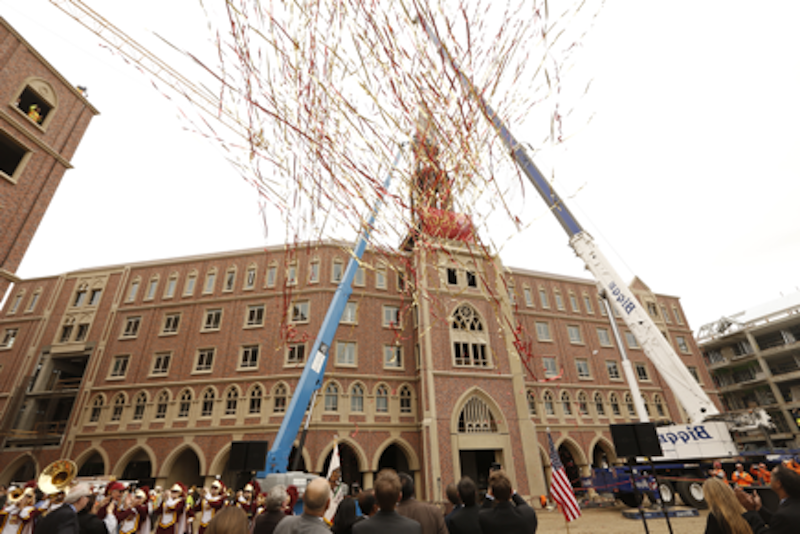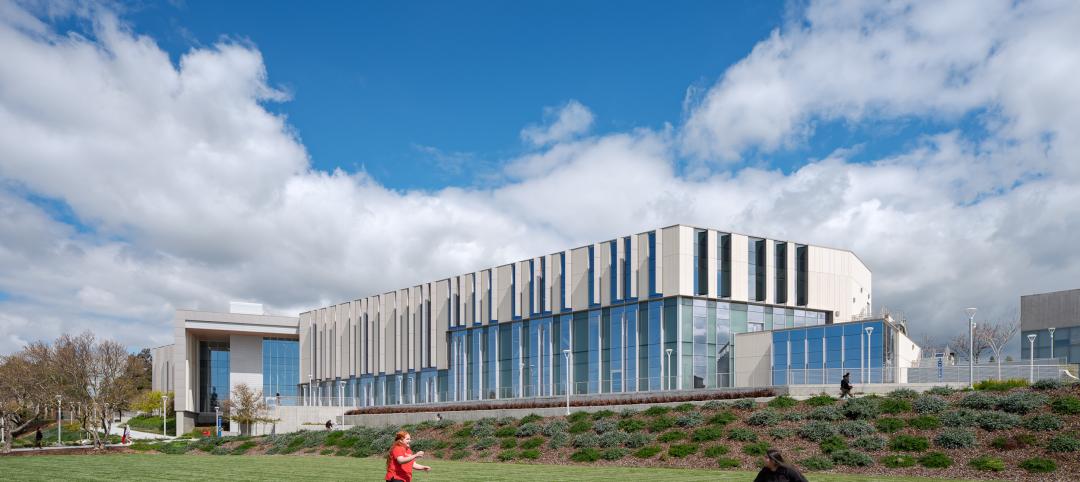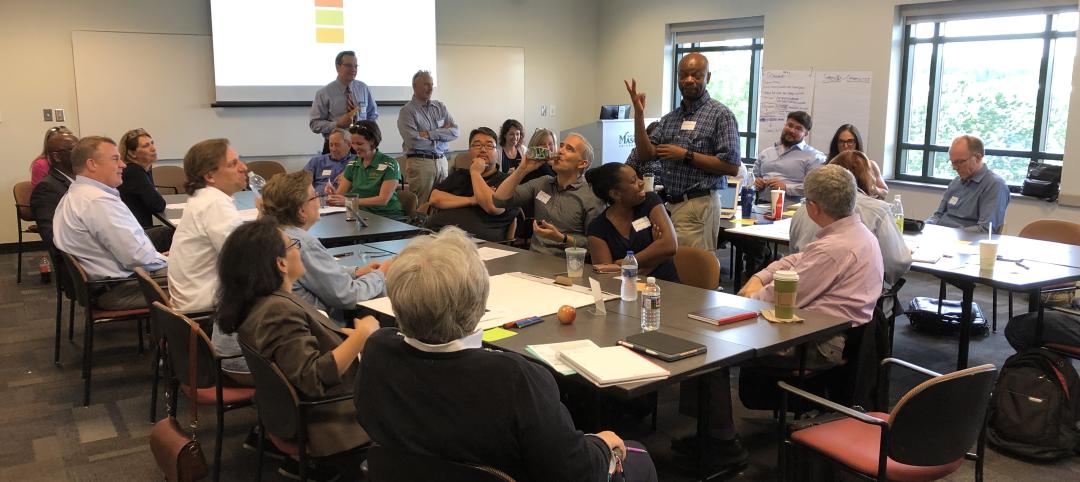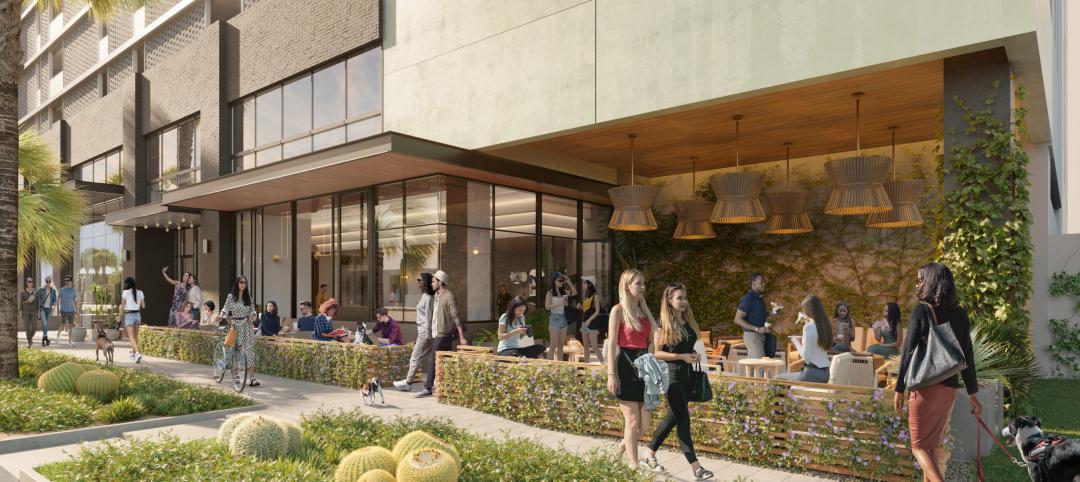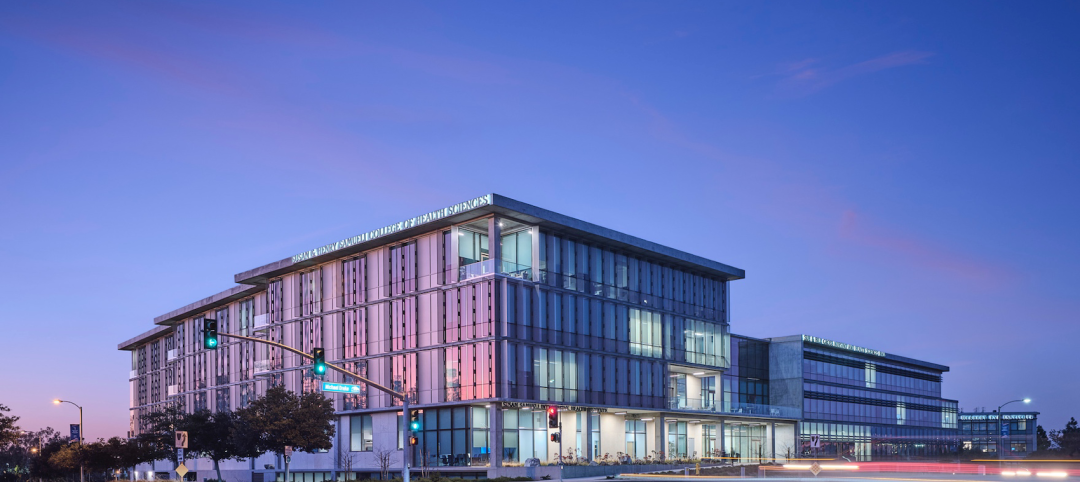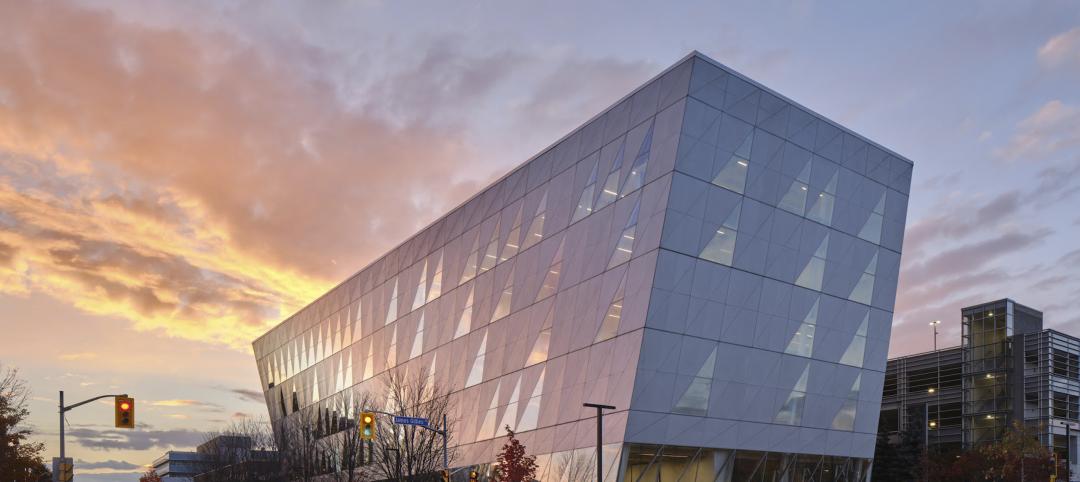This month, work crews began moving furniture, fixtures and equipment into USC Village, the biggest development project in the history of South Los Angeles, which is on schedule to be ready for the fall semester at the University of Southern California’s University Park campus.
The $700 million, 15-acre USC Village, which has been in the works since 2005, will consist of six buildings with a total of 1.25 million sf of space and 2,700 student beds. There will be eight residential colleges within USC Village, four of which had been endowed at presstime.
To view a flyover of the Village’s construction site, click here.
When USC Village was conceived, it was one of the first mixed-use residential college projects in the nation, and when completed it will include 100,000 sf of retail space for 30 tenants such as Bank of America, Starbucks, Target, and Trader Joe’s (which will be welcomed in South L.A. a food desert when it comes to supermarkets).
The Village will also have food and beverage outlets, and a 30,000-sf fitness center. The Village will provide 1,200 covered bike-parking slots, and another 500 slots for day-to-day bike parking by patrons of the gym or retail stores.
The exterior design of USC Village is best described as “collegiate gothic,” and reflects the mandate by USC’s president C.L. Max Nikias that the look of the Village be connected to the rest of the campus. “We could introduce any design feature, as long as it was gothic,” says Daniel Benjamin, AIA, LEED AP BD+C, Principal and Design Leader for Harley Ellis Devereaux, USC Village’s architect.
That meant a lot of detailing at the ground plane and roof level, but more traditional brick façade in the middle.
Benjamin notes that there weren’t enough masons in southern California to handle of project of this magnitude. So instead of importing workers from other parts of the state, the Building Team—which includes Hathaway Dinwiddie as the GC—decided to precast the concrete facades off site, typically delivered in 12- by 20-ft modules. Brick trimmed with sandblasted warm-colored concrete surrounds gives the buildings a three-dimensional sense of detail.
Prefabrication also cut the construction process, which began in June 2014, by nearly a year. These buildings are designed to last 80-100 years.
During the approval process, three major changes were made to USC Village’s plan, recalls Willy Marsh, USC’s director of construction. A large parking garage with a field on its roof became underground parking. High-rise residential towers became low-rise buildings. And a much larger retail center was de-emphasized. “The decision was made that retail wasn’t going to drive this project,” says Marsh.
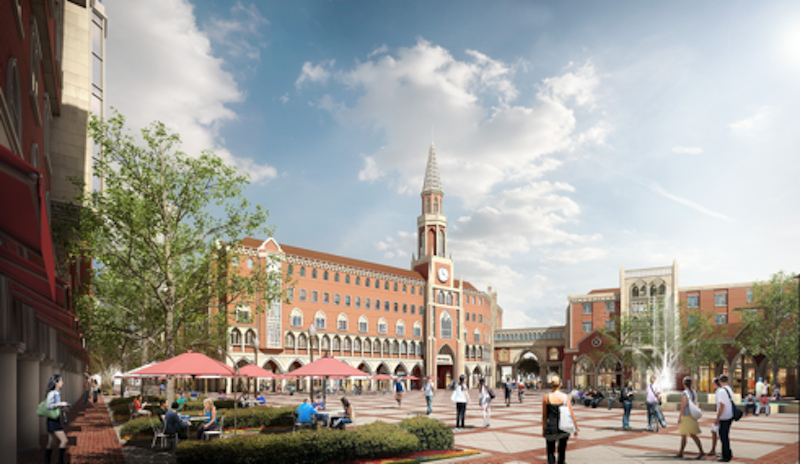
The buildings' facade consists of precast concrete and brickface that mimics older buildings on campus. Image: USC
USC Village comprises about 20% of the University Park campus, and Nikias, says Benjamin, wanted the connections to be seamless. So the Village’s pathways and streets flow seamlessly into the larger campus’s circulation routes. More than 200 trees will be planted within and around the Village.
This campus is an integral part of the surrounding community. As part of this project, USC is providing $40 million in community benefits, including a $20 million contribution to an affordable housing fund that is managed by the city.
The number of student beds could increase to 5,000 if USC decides to redevelop a 12-acre lot adjacent to USC Village. Marsh says that project could be a decade away.
Related Stories
University Buildings | Jun 14, 2023
Calif. State University’s new ‘library-plus’ building bridges upper and lower campuses
A three-story “library-plus” building at California State University, East Bay (CSUEB) that ties together the upper and lower campuses was recently completed. The 100,977-sf facility, known as the Collaborative Opportunities for Research & Engagement (“CORE”) Building, is one of the busiest libraries in the CSU system. The previous library served 1.2 million visitors annually.
Higher Education | Jun 14, 2023
Designing higher education facilities without knowing the end users
A team of architects with Page offers five important factors to consider when designing spaces for multiple—and potentially changing—stakeholders.
University Buildings | Jun 9, 2023
Cornell’s new information science building will foster dynamic exchange of ideas and quiet, focused research
Construction recently began on Cornell University’s new 135,000-sf building for the Cornell Ann S. Bowers College of Computing and Information Science (Cornell Bowers CIS). The structure will bring together the departments of Computer Science, Information Science, and Statistics and Data Science for the first time in one complex.
Student Housing | Jun 5, 2023
The power of student engagement: How on-campus student housing can increase enrollment
Studies have confirmed that students are more likely to graduate when they live on campus, particularly when the on-campus experience encourages student learning and engagement, writes Design Collaborative's Nathan Woods, AIA.
Urban Planning | Jun 2, 2023
Designing a pedestrian-focused city in downtown Phoenix
What makes a city walkable? Shepley Bulfinch's Omar Bailey, AIA, LEED AP, NOMA, believes pedestrian focused cities benefit most when they're not only easy to navigate, but also create spaces where people can live, work, and play.
Higher Education | May 24, 2023
Designing spaces that promote enrollment
Alyson Mandeville, Higher Education Practice Leader, argues that colleges and universities need to shift their business model—with the help of designers.
University Buildings | May 17, 2023
New UC Irvine health sciences building supports aim to become national model for integrative health
The new College of Health Sciences Building and Nursing & Health Sciences Hall at the University of California Irvine supports the institution’s goal of becoming a national model for integrative health. The new 211,660-sf facility houses nursing, medical doctorate, pharmacy, philosophy, and public health programs in a single building.
University Buildings | May 11, 2023
New ‘bold and twisting’ building consolidates School of Continuing Studies at York University
The design of a new building that consolidates York University’s School of Continuing Studies into one location is a new architectural landmark at the Toronto school’s Keele Campus. “The design is emblematic of the school’s identity and culture, which is centered around accelerated professional growth in the face of a continuously evolving labor market,” according to a news release from Perkins&Will.
Sustainability | May 11, 2023
Let's build toward a circular economy
Eric Corey Freed, Director of Sustainability, CannonDesign, discusses the values of well-designed, regenerative buildings.
Digital Twin | May 8, 2023
What AEC professionals should know about digital twins
A growing number of AEC firms and building owners are finding value in implementing digital twins to unify design, construction, and operational data.


